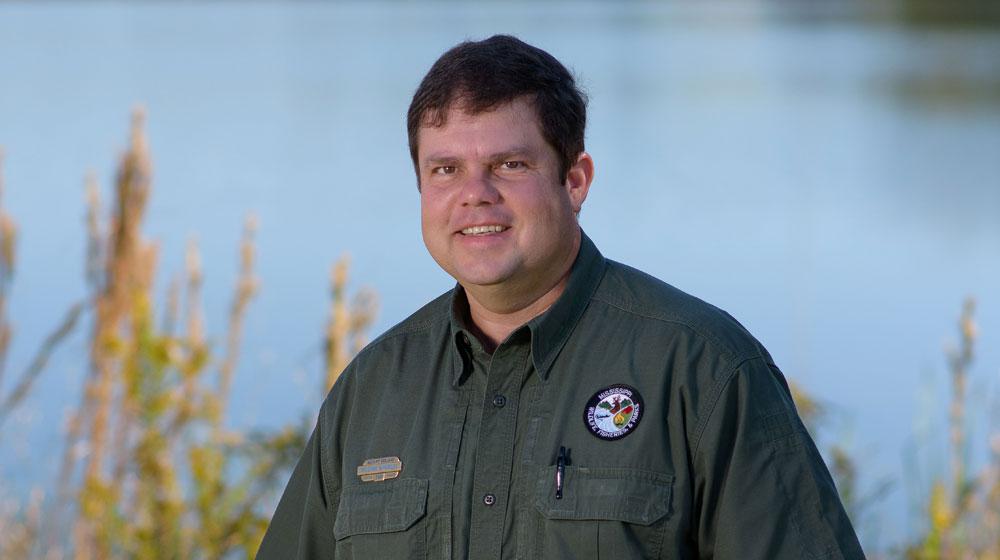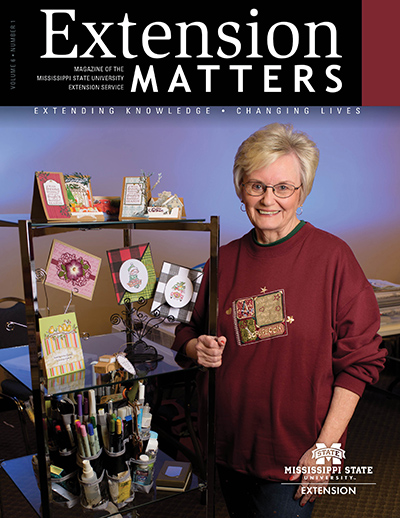Protecting Tomorrow’s Deer

After Mississippi became the 25th state with a case of chronic wasting disease, more protections were put in place for the deer population.
MDWFP, Extension educate public on chronic wasting disease
Story by Nathan Gregory • Photos by Kevin Hudson
Mississippi became the 25th state with a confirmed case of chronic wasting disease (CWD) in February 2018. Since then, state agencies have been working together to protect the state’s deer population.
The Mississippi Department of Wildlife, Fisheries, and Parks (MDWFP) teams with Mississippi State University in several ways to this end. The Mississippi Veterinary Research and Diagnostic Laboratory, a unit of the MSU College of Veterinary Medicine, has tested each of the samples the MDWFP has collected since October 2018, and MSU serves as the research department within MDWFP.
But hunters have to know what CWD is and how to get their harvested deer tested for the disease to prevent its spread. The MSU Extension Service provides this education to protect the state’s deer population and hunters.
CWD is a contagious, fatal, neurological disease that causes a degeneration of the brain and physical deterioration of white-tailed deer—a popular hunting-season target in Mississippi. As of November 2019, there were 20 positive samples out of more than 8,500 taken since the first case was confirmed. These were found in six counties, including seven each in Marshall and Benton Counties. The first confirmation was in Issaquena County, and samples from Panola, Pontotoc, and Tallahatchie Counties have also tested positive for the disease.
“We had been sampling every year since 2002 but became much more concerned when Arkansas confirmed a case of it in 2016,” explains MDWFP wildlife biologist William McKinley. “That was when we decided to make a very strong push to hunters and the general public to report sick deer, and that is how we originally found the disease. One of the best ways to find the disease is by sampling sick animals.”
“CWD management is a very serious and complicated topic. As soon as we heard the news that CWD was present in Mississippi, we went to work to determine all the various educational platforms we could use to get reliable, research-based information to the hunting public of Mississippi.”
— Dr. Bronson Strickland
Dr. Bronson Strickland and Dr. Steve Demarais, deer biologists and codirectors of the MSU Deer Lab, have played a major role in that push. They have discussed CWD in several episodes of the Deer University podcast, which they host to provide hunters with the latest research on deer management.
“CWD management is a very serious and complicated topic. As soon as we heard the news that CWD was present in Mississippi, we went to work to determine all the various educational platforms we could use to get reliable, research-based information to the hunting public of Mississippi,” says Strickland, also an Extension professor. “Newspaper and magazine articles, podcasts, and face-toface seminars were all part of our plan to educate hunters.”
They also designed pre- and post-surveys used by MDWFP at their public hearings in areas where CWD cases have been confirmed.
“We have conducted seven public hearings, which Dr. Strickland and Dr. Demarais attended, and well over 100 public presentations, many in conjunction with local MSU Extension offices,” McKinley says. “The surveys they made for us are helping us determine how effective we are at educating people about CWD and getting more hunters to get their deer tested.”
To control disease prevalence, MDWFP has adjusted some hunting regulations in CWD zones. “We have made more liberal bag limits on antlerless deer, and we have dropped antler criteria in these areas so hunters can take some 1-year-old bucks so we can get some of those into our samples,” McKinley says. “We have also banned feeding in the CWD zones and restricted carcass movement of deer taken in those zones.”
As of November 2019, there were 36 drop-off locations across the state where people can leave the heads of harvested deer in a freezer for MDWFP staff to send off for sampling. Sick deer can be reported by calling the agency or using its smartphone app. The Centers for Disease Control and Prevention recommends that hunters get their deer tested if they are hunting in a CWD zone and that they not eat meat from an infected animal.
“Hunters are the key to our success in our management efforts, and we encourage them to stay engaged in this process,” McKinley says.


